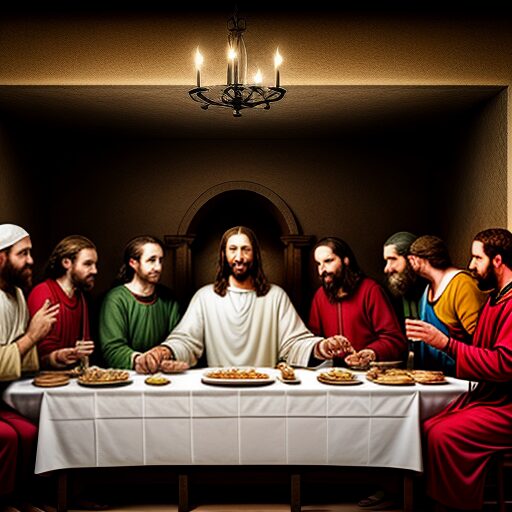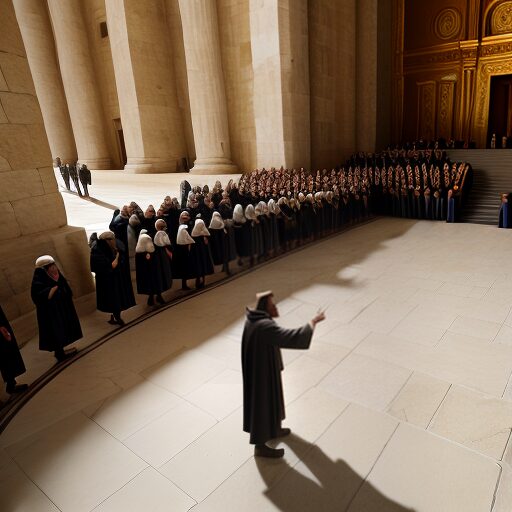Mikveh or Baptism? Which Is It? Part 2 of the True Biblical Baptism Series
This week’s teaching will take us back a year and a half ago when I started a teaching on True Biblical Baptism. That teaching was a subset, if you will, of our multi-installment Paul and Hebrew Roots teaching series I began many years ago. Unfortunately, as it relates to the True Biblical Baptism teaching, which was to be a multi-installment teaching within the Paul and Hebrew Roots series, I only completed one installment. Again, that was a year and a half-ago. I know I left some of you, my listeners, kind of hanging by not completing this important series, but I aim to rectify that failure over the coming weeks.
So, this week, the title of our discussion will be “Mikveh or Baptism: Which is it?” It will be the 2nd installment to our “True Messianic Baptism Series.”
Now, if you’ve not had the opportunity to listen to or read Part 1 of this Baptism series, I would humbly encourage you to do so. It is entitled, “True Biblical Baptism — We Were Baptized into Moses in the Red Sea.”
I will place the link to that post in the transcript to this teaching for your convenience. That post was an hour and seven minutes long, packed filled with content on our subject. It stands on its own, and thus, I will not repeat the content of that teaching. We have enough content for this installment of the series to keep us quite busy. So, what do you say we delve into our study?
_______________________________________________________
Baptism Follows Trusting Faith and Teshuvah
It should not be a secret to anyone coming into or transitioning into this beloved faith of ours that baptism, more correctly, water immersion, is a requirement of all would-be disciples of Yahoshua Messiah. In fact, water immersion tends to be the second thing a person transitioning into our faith undertakes. The first thing being, of course, is to believe in the Person and ministry of Yeshua Messiah which involves teshuvah or repentance.
In order for there to be true teshuvah and repentance, the would be disciple of Yeshua must abandon-leave behind their old life for the newness of life which is in Yeshua Messiah (6:4). This is essentially what Paul referred to as an obedience of faith. That obedience of faith, if you will, is followed by water immersion, popularly referred to as Baptism by our denominationalist cousins and mikveh by many within our Messianic faith community.
I posted a teaching entitled “Invitation to Messianic Discipleship — From Sinner’s Prayer to Messianic Discipleship” where I outline the essential steps for entering into a covenant relationship with the Creator of the Universe through the Person and ministries of Yeshua Messiah. So, if you feel the tug/the pull of the Holy Spirit, leading you to walk in Yeshua’s footsteps as His true disciple and to live a Torah-honoring life, if you’ve not already done so, I humbly encourage you to check out that teaching at your earliest convenience. Beloved, today is the day of salvation (2 Cor 6.2)!
Baptism, or more accurately, water immersion, became an essential act taken by everyone who hearkened to John the Baptist/Immerser’s call to repentance and teshuvah in anticipation of imminent arrival of the Kingdom of God. Countless Judeans responded to John’s call to teshuvah and water immersion. Master Yeshua was one of those Judeans, although His response to John’s call was to, as Yeshua declared to John, ”fulfil all righteousness” (Mat 3.15). And from that time forward, after returning to Judea from His wilderness testing, Master Yahoshua preached the Gospel and His disciples baptized the masses (Joh 3.22; 4.1-2). Even after the Master ascended to His Father on-high, Yeshua’s disciples-turned-apostles baptized any who came to faith in Yeshua as their Messiah. And of course, baptism or water immersion remains to this very day an essential act of trusting faith and affiliation with Yeshua and repentance of any who enters into a covenant relationship with Yehovah through Yeshua Messiah.
Now, prior to John the Immerser and Yeshua our Master, Yah set forth provisions for Israelis to regain lost ritual purity. Ritual purity was necessary in order for our Hebrew cousins to worship at the Tabernacle or Temple. In all cases where our cousins sought to regain their ritual purity, they were required by Yah to bathe in living water (aka a mikveh). The terminology related to the act of bathing has today been conflated with the physical body of living water that the impure one bathes in. Both the act of ritual bathing and the body of water in which the ritual bathing takes place are referred to in our Faith community as mikveh, which is technically wrong. The mikveh, according to Jewishencyclopedia.com, means “a collection, a collected mass, especially of water” (http://www.jewishencyclopedia.com/articles10827-mikweh). Our Jewish brethren undertake ritual bathing in what is call mikva’ot today, generally for proselytization (Gentile conversions to Judaism) and purification of Jewish women at the end of their menstrual cycles or after giving birth.
Consequently, ritual bathing, or being what is erroneously referred to as being mikveh’d, has become synonymous with Messianic water immersion or baptism. And as we will see, Hebrew or Jewish ritual bathing is NOT Messianic water immersion. And as we progress through the rest of this teaching, we will understand the difference between these two acts of faith.
Because this topic on the Mikveh or Baptism is so large, we’ll look at the Mikveh today, and then we’ll pick up the Baptism or water immersion next installment.
The fundamental point behind ritual water immersion is mostly lost because the temple is no longer in existence nor operational.
___________________________________________________________
Ritual Purification (The Mikveh) to Engage in Temple Worship
“Purification” through ritualistic immersion in water: a Hebraic principle.
Prior to entering the Temple for worship or prayer, the faithful were required to purify themselves via mikveh. Consequently, numerous mikveh baths or pools have been excavated in and around the Temple Mount complex, especially in places believed to have been entry-ways to the Mishkan/Temple proper.
Torah required every head of household conduct pilgrimages to the Temple in Yerushalayim for Pesach, Shavuot, and Sukkot. So then, every Hebrew pilgrim would undergo a ritualistic bathing, at least upon their arrival in Jerusalem, using one of the many Mikveh pools that were strewn in and around Jerusalem and the Temple complex. Some pilgrims would engage in ritualistic bathing via the mikveh each time they entered the Temple Complex grounds.
Yahoshua and His disciples, when ministering in Yerushalayim, worshiped and prayed at the Mishkan daily. Some Second Temple savvy Messianic teachers have suggested that they engaged in ritualistic bathing using these mikva’ot (multiple mikveh pools) each time they entered the Temple complex (Mat. 26:55; Mar. 14:49; Luk. 19:47; 22:53; Act. 2:46; 3:2; 5:42). I guess it is possible, but there is no biblical proof of that. But I get these teachers’ overall point that ritualistic bathing and the mikva’ot were essential, integral components of Second Temple worship. And that fits in with Abba Yah’s Torah requirements that our ancient Hebrew cousins be in a state of ritual purity in order for them to worship at the Tabernacle.
The Purpose of Ritualistic Water Immersion
The point of Temple ritual bathing or being mikveh’d was to separate the common from the set-apart (i.e. the holy) unto Yah. It served a purification purpose. It symbolically, and in many cases, spiritually prepared our ancient Hebrew cousins for Temple worship.
Many faithful orthodox Yehudim (aka Jews) today undergo ritualistic bathing in a mikveh prior to every Shabbat, and for special Jewish-related celebrations and devout observances taking place at their local synagogues.
To the observant Rabbinic Jew, the so-called mikveh is not about one cleansing the outside of their physical bodies in preparation for worship and religious observances. But rather, the mikveh is symbolic of the cleansing of one’s inward man and woman in order to make themselves presentable to Yah; to be brought to a set-apart state to commune with the Creator of the Universe.
Beyond its purification relevance to observant Orthodox Jews, mikveh still exists as a requirement for one’s conversion to Judaism.
Living Water-Mikveh
Tvilah is the act of immersion in living water (mikveh). Living water is a body of water that is naturally sourced, thus the term living water. Obviously, when Yah gave us the instruction to bathe in order to restore our ritual cleanliness, the medium in which we bathed was living water or natural water. The thinking by our Jewish cousins is that living water is required to carry away the impurities that prevented us from worshiping before Him.
Regarding the waters of the mikveh experience, noted Messianic teacher and Second Temple expert, Rico Cortes stated the following: “Water symbolizes birth as an Yisra’elite—Submerging in a pool of water for the purpose, not of using the waters physical cleansing properties, but expressly to symbolize a change of soul, is a statement at once deeply spiritual and immensely compelling. No other symbolic act can so totally embrace a person as being submerged in water, which must touch and cover every lesion; every strand of hair; every birthmark. No other religious act is so freighted with meaning as this one which touches every aspect of life and proclaims a total commitment to a new idea and a new way of life as it swallows up the old and gives birth to the new.”
Note: Hebraic/Jewish Mikveh does not equate to dunking or sprinkling one in a baptismal pool. The candidate immerses themselves either forward or straight up or down. The baptizer is there as a witness only. And Judaism requires at least two witnesses for the immersion to be valid.
Cortes continued: “The water of the mikveh is designed to ritually cleanse a person from deeds of the past. The convert is considered by Jewish law to be like a newborn child. By spiritually cleansing the convert, the mikveh waters prepares him or her to confront Elohim, life, and the people with a fresh spirit and new eyes. It washes away the past, leaving only the future. Of course, this does not deny that there were good and beautiful aspects of one’s past. But, in the strictest religious sense, that past was only prologue to a future life as a Jew.”
“If we take this graphic metaphor a step further, we can sense that the mikveh is a spiritual womb. The human fetus is submerged in water. It does not yet live. The water breaks in a split-second and the child emerges into a new world (I.e., being born again—born into the Kingdom of Yah). As soon as the convert immerses, he or she is a Jew in every respect” (Yevamot 47b; Rabbi Maurice Lamm; Wisdom in Torah Ministries-Wisdomintorah.com).
It should be noted that all Rabbinic sources agree that the “mikveh” in and of itself saves no one. But rather, the mikveh prepares the devout one for coming into the presence of Yah (similar to the requirement for immersion prior to our ancient cousins being permitted to worship at the Temple).
The Great Flood was, in a spiritual sense, a mikveh” of the world. Through the waters of the flood, the world was restored back to its previous state. Also, the Exodus and the crossing of the Red Sea Crossing when viewed from the perspective of mikveh was symbolic of our coming from under the rule of Babylon — Egypt and her gods — to the rule of Yehovah Elohim.
Ritual Purity and the Mikveh
The purpose behind Torah-based ritual bathing or water immersion was to restore a Hebrew to a place of “ritual purity”.
Why would a Hebrew find themselves in a state of ritual impurity, and why would he need to be made ritually pure?
In order for one to be eligible to worship at the Temple/Tabernacle, he or she must be in a state of ritual cleanness. One becomes ritually impure when they come into contact with the remains of the dead, be it human or animal or contract an illness such as leprosy. For women, their monthly cycle or child-birthing required them to undergo ritual bathing in order to restore their ritual cleanness.
The underlying principle here is that when one is ritually impure or unclean, their uncleanness will invariably be transferred onto that which Yehovah has deemed holy.
Every form of uncleanness is a byproduct of sin. Consequently, sin, filth, death, and all other manner of uncleanness are critical factors that separate us from our Creator. Whether it’s physical or spiritual uncleanness, Yah does not tolerate it in His presence (Leviticus).
Regarding Second Temple period mikveh or ritual bathing, in particular in connection to Yom Kippur — the Day of the Atonements — Messianic Torah teacher Rico Cortes notes: “There are other times when it is customary to be immersed in the mikveh such as before Yom Kippur, as a sign of purity and repentance and before Shabbat in order to sensitize oneself to the holiness of the day” (Rico Cortes).
The point was to put one in a place of holiness.
True ritual immersion requires the devout to be totally submerged in the body of water (I.e, the mikveh). All mikveh operations and practices in Judaism were and remain so today precisely controlled by Jewish law (aka the Talmud).
That Which Makes One Unclean
Torah describes several life events that Yah classified as making one unclean: seminal discharges and menstruation; infections; certain maladies; human remains; unclean animals and their carcases, were all causal to one falling into an unclean state which made them unfit to worship at the Tabernacle or Temple.
The prophet Yesha’Yahu/Isaiah viewed ritual uncleanness beyond those physical items I just mentioned. His level of uncleanness spotlighted the very heart and sinful soul of man. And this is the underlining purpose behind ritualistic bathing that the Father wanted us to glean from the mikveh. If our heart is not right and sin is not adequately addressed in our lives, no amount of living water can cleanse us from our uncleanness and our acceptability to Yehovah.
(1) Look, the hand of Yehovah has not become too short to save, nor His ear too heavy to hear. (2) But your crookednesses (i.e. your iniquities) have separated you from your Elohim. And your sins have hidden His face from you, from hearing. (3) For your hands have been defiled with blood, and your fingers with crookedness (i.e. guilt); your lip have spoken falsehood, your tongue mutters unrighteousness. (4) No one calls for righteousness, and no one pleads for truth … (7) Their feet run to evil, and they hurry to shed innocent blood. Their thoughts are thoughts of wickedness, wasting and ruin are in their highways … For our transgressions have increased before You, and our sins witnessed against us. (Chapter 59; The Scriptures ISR).
Mikveh and Proselytizing
As far back as the first century, Rabbinic Judaism requires any who would convert to the Jewish religion undergo ritual water immersion or be mikveh’d as a final act in their conversion journey. It should be noted, however, that ritualistic water immersion for purposes of converting non-Jews to Judaism is not found in the Tanach. The practice is in fact an addition to Torah (which adding to or taking away from Torah is considered a violation of Torah by Yah).
“Immersion, tevillah, is the common-core component of every [traditional] Jewish conversion process, for both male and female; adult and child. A conversion without immersion is unacceptable to the traditional, religious community and simply not Jewish in character.” (Rico Cortes)
According to Messianic Torah teacher Rico Cortes, “Immersion must be viewed from the perspective of one transitioning from that of a non-Hebrew, to that of a member of Yisra’el. The “mikveh” was given exclusively to Yisra’el for this express purpose by YHVH” (Rico Cortes).
To pious Jews, in particular the Essenes — a first-century Jewish sect who were believed to have lived in Qumran — the “mikveh” represented a transition from the common/impure to the set-apart or the pure. From the sin of the world to the Qedosh of Yah. From the old-man/woman to the new-man/woman. From the person in the womb to being born again.
In ancient times, immersion was to be performed in the presence of witnesses (Yebam 47b). The candidate being baptized makes special preparations by cutting his/her nails, undressing completely, and making a fresh profession of his/her faith before the designated “fathers of the baptism” (Kethub. Iia; ERub 15a). Yes beloved, the bather is always naked when engaging in ritual water immersion of the mikveh. So now can you see that Messianic Water Immersion is not the same as the ancient ritual of the Mikveh?
In Judaism, the convert takes on the name of the rabbi teaching and guiding the convert in his/her transition into the religion.
The Physical Mechanics of Ritual Bathing or the Mikveh For Conversion Purposes
Judaism views and treats ritual water immersion as an act that is done in the physical, but representing the spiritual. It’s an outside, physical act, but most importantly, it’s an inward, spiritual act of transition.
What follows are some mechanics to the Jewish conversion mikveh.
“1. Immersion was accompanied by exhortations and benedictions (Maimondes Hilk. Milah iii.4; Hilkh. Iss., Biah viv. 6).
- A convert would reaffirm his acceptance of Torah by declaring, “I will do and I will hear,” which was a phrase from the oath that was originally taken by the priests not to forsake Torah (Deuteronomy 29:9-14).”” According to the so-called Jewish sages, water immersion or mikveh must be accompanied by a profession of Faith, such that the convert declares: ”I will shema..”
“3. The Jewish baptism candidates were often immersed 3-times. The idea of total immersion comes from Scripture in Leviticus 15:16 where it says: “he shall wash all his flesh in the water.” One reason it was customary to immerse 3-times was because the word “mikveh” occurs 3-times in Torah.”
“4. According to Jewish law, the immersion had to have a required witness. Dr. William LaSor in the Biblical Archeaology Review says apparently, the Biblical phrase “in the Name of” was an indication of the required witness.”
“5. The immersion candidate was not touched by the baptizer in Yahoshua’s day.
- Leviticus 15:16 states: “He shall wash all his flesh in the water.” From this verse, Judaism stresses that the entire body must come into contact with the waters of the mikveh. To ensure that the immersion is indeed valid, no clothing of the individual could touch the candidate.
“Any such intervention that prevented water from reaching a part of the body was known as “chatzitzah” and rendered the immersion invalid. Although the mikveh was more spiritual than physical, the bath consisted of 2-sets of steps: One for entering the mikveh, and the other leaving or exiting, so as to not defile what had been purified.”
The mikveh candidate is supposed to be completely nude.
“7. The baptismal water (mikveh) in Rabbinic literature is referred to as “the womb of the world.” And so, as a convert comes out of the water he/she is considered to have undergone a new birth that has resulted in them being separated from the world. As the convert came out of these waters, his spiritual status is changed and he/she is referred to as “a little child just born” or “a child of one day”” (Yeb. 22a:48b; 97b). Do you catch the similarities that the so-called mikveh has with true Messianic Water Immersion baptism?
Mikveh Without Repentance is Moot
The so-called Jewish sages recognized that repentance must accompany water immersion or ritual bathing. The Jerusalem Talmud: “Nothing can stand before repentance” (Yebamos 47b).
According to Dr. David Flusser (an Israeli professor of early Christianity and Judaism of the Second Temple period at the Hebrew University), “The Dead Sea Scrolls, as well as the NT teach that water can purify the body only if the soul has first been purified through repentance and righteousness.”
Thus, as it relates to the mikveh, repentance and teshuvah are key. For without repentance or teshuvah, mikveh means nothing. Teshuvah, by the way, is a Hebrew term that means “to turn around and come back.” With this in mind, it should be understood that only they who were once in a covenant relationship with Yah can turn around and come back to an obedience of Faith. However, as it relates to the non-Jew or the Ger convert, they must, upon emerging from the mikveh waters, commit to walking in their new life. These are to commit to Shema Yehovah and His commandments and ways.
______________________________________________________
Concluding Thoughts
What I’ve given you here in this teaching regarding the act of ritual water immersion, popularly referred to as the mikveh, is only a skimming of the surface on this very complex and multi-faceted subject.
I wanted to pass on to you some the necessary information regarding the Hebrew and Jewish mikveh — the Hebrew mikveh from the standpoint of Yah’s Torah instructions regarding it — the Jewish mikveh from the standpoint of Rabbinic practices and teachings. Because we are so spiritually linked to our Jewish brethren, many of their traditions and teachings have clouded and brought confusion to our Messianic Faith. The so-called mikveh of Rabbinic Judaism, and the mikveh for ritual purity, although bearing a great deal of spiritual implications and applications, is not the same as true Messianic Water Immersion — popularly referred to as baptism. In the next installment to this series, we will examine true Messianic Water Immersion — the water immersion that our Master Yahoshua and His cousin John implemented into their Gospel work and that is required of every would be disciple of Yahoshua haMashiyach.
Until then, may you be most blessed, fellow saints in training. Shabbat shalom; shavuatov; take care.






